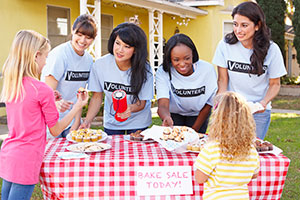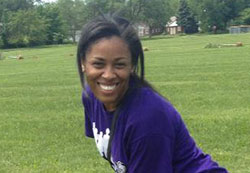Section navigation
Community relationships
 You probably know that it's important to have healthy relationships with family and friends. It's also a good idea to work on relationships within your community. Your community includes your neighborhood, school, afterschool groups, and a house of worship, if you have one. Keep reading to learn more about:
You probably know that it's important to have healthy relationships with family and friends. It's also a good idea to work on relationships within your community. Your community includes your neighborhood, school, afterschool groups, and a house of worship, if you have one. Keep reading to learn more about:
Connecting with your community  top
top
Helping your community can make you feel like you belong and have something to offer. Having community means you have people you trust and who trust you. It means you are never really alone.
Here are some ways you can be a great member of your community:
- Treat other people well
- Show other people respect even if you have beliefs that are different
- Get to know people before making up your mind about them
- Stand up for your beliefs
- Be someone people can rely on to do a good job
- Volunteer at places like a nursing home or homeless shelter
- Help an elderly neighbor or someone else who could use a hand
 Building a better community
Building a better community
Kayla grew up in a neighborhood where lots of kids were poor and dropped out of school. When she was 15, she stepped up to help kids succeed in school. She joined with other youth leaders and managed to get her school district to make some major changes. Those changes helped open the doors to college for thousands of students. Now she teaches other young people how to get involved. As she says, "When I look back at my past experiences, it amazes me what a youth from South Central [LA] was able to accomplish. I enjoy giving other youth the same feeling." Read more.
Getting help from adults in your community  top
top
Adults can give you advice and can help you find information and opportunities. They also can help you find professionals like tutors and doctors. And they can offer kindness and support when life gets tough.
The mentor model
Adults often can help you as a mentor, someone who gives you advice, support, or help with things like homework.
Sometimes, you may have a pretty serious problem, and the adult you go to may not know how to help. Don't give up! Go to another adult until you get the help you need.
Here is some more useful info on getting help:
Are you having problems with schoolwork? Talk to your teacher or your school counselor. It's their job to help you do well in school. They can give you tips on studying and may be able to get you some extra help.
Are you having problems with a friend, teacher, parent, or guardian? A school counselor or social worker can offer ideas for how to make the situation better. They also might be able to meet with you and the other person. And if you need more help, they can suggest people to see, such as a therapist.
Do you have health or medical questions? People you can see include a school nurse, health teacher, or doctor. Teens often have lots of questions about things like puberty, sex, and mental health. You may feel shy about discussing these topics, but keep in mind that doctors and other health professionals have heard it all before! Need a doctor? Your family may be able to find low-cost care in your community.
Content last reviewed September 16, 2015
Page last updated November 09, 2015







